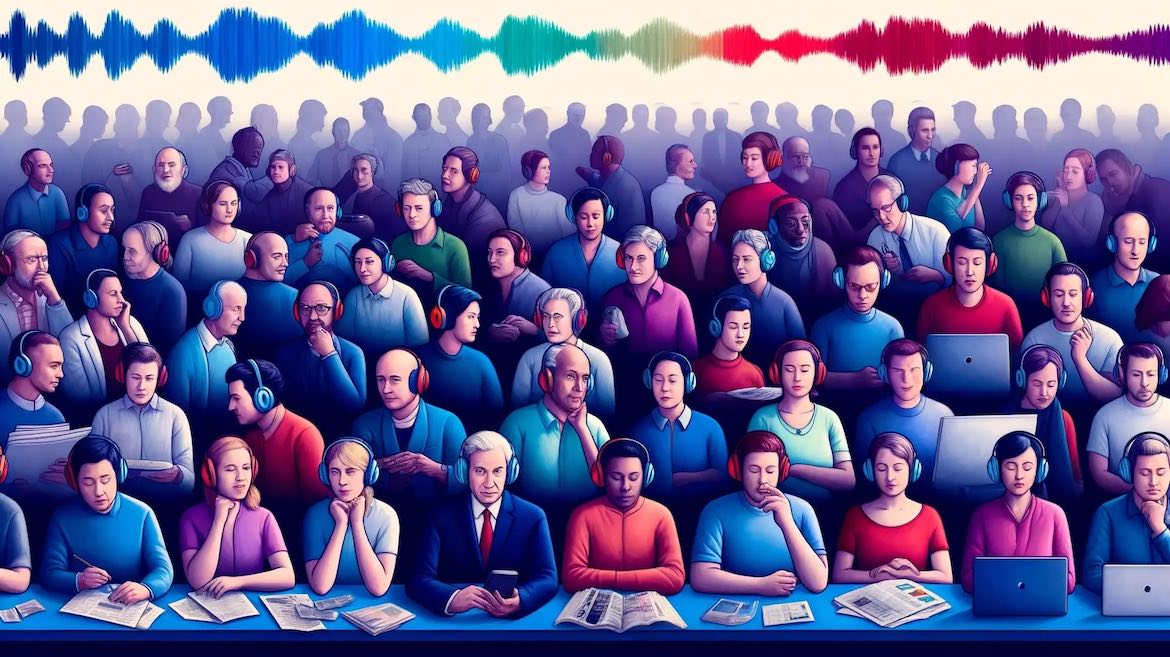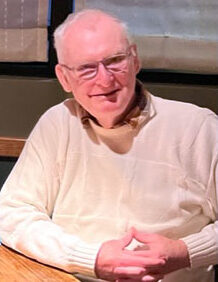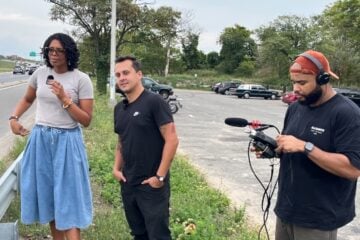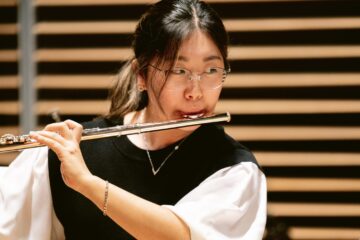How public radio can serve listeners from across the political spectrum

Mike Janssen using DALL-E
Public radio strives to serve everyone with objective news, but it attracts liberals and repels conservatives.
I won’t speculate about why, but it has been true from my days as first producer of All Things Considered in the 1970s. If anything, has become more extreme.
We didn’t seek liberals, but they found us.
That’s not what the National Public Radio Purposes, written in 1970 by Bill Siemering, intended. That document envisioned a “kumbaya” network, where a wide range of people convened to exchange experiences and ideas. It’s an inspiring concept that I continue to embrace, but it proved unrealistic in the fragmented radio world of the 1970s, when each station sought to superserve a targeted niche.
Fifty years later, an infinitely more fragmented media world makes that ideal impossible, but no less important.
Public radio achieved success by setting aside its original purposes in favor of a radio version of the New York Times that attracted a New York Times–style audience — educated, academic liberals, nearly all white and economically comfortable, of course.
Today it has competition for that audience, not the least from the New York Times itself, which is now firmly in the audio business. My academic liberal acquaintances in Madison, Wis., used to cite news stories they heard on Morning Edition and NPR; now they cite Morning Joe and MSNBC at least as frequently.
Not surprisingly, public radio audiences have stopped growing and listener loyalty has declined. It’s not because the quality of our news coverage has declined. Our traditional audience simply has more choices.
I’m not advocating for public radio to change its journalism or the audience it has served for the past 50 years, although there is a real need to seek a younger version of that audience.
Public radio can, however, create a complementary strand of broadcast and on-demand content for a more politically diverse audience. This would certainly answer critics who point to public radio’s liberal bias. It might also provoke thinking in public radio’s core audience.
In addition to its fact-based journalism, public radio should serve as a forum that welcomes all points of view, including those current listeners may find distasteful, expressed without the intervention of reporters and editors. It should offer a place for debate, persuasion and compromise.
Does anyone really want to hear that? I may be the only one. But does our society need it? Absolutely.
At the time the NPR Purposes were written, the infant PBS featured a program produced by the Harvard Law School and WGBH called The Advocates. Two lawyers made the case in a trial format for and against a public policy option, each calling witnesses who were cross examined by both friendly and hostile lawyers. No jury issued a verdict, but the audience witnessed a clash of ideas. Progressives and populists, liberals and conservatives, heard their preconceptions reinforced and challenged. It caused viewers to think and rethink. And it entertained, incorporating the drama of a courtroom. There is a reason Law and Order continues into its umpteenth season.
I am not suggesting that public radio literally bring back the Advocates but do revive the intentions behind that program. Add balanced and rational debate to the current menu of objective journalism and carefully controlled interviews.
To my tired old ears, public radio has become too predictable and a bit boring. Too often I tune away. Fix that by letting ideas clash. Generate light with some heat.
During the era of The Advocates, Siemering also wrote about how the radio station he managed reacted to an anti-war demonstration at its home university. WBFO in Buffalo, N.Y., used a trained mediator to moderate and seek consensus on the air between university administrators and demonstrators. I don’t know how it worked out in practice; in theory, that is exactly what our nation needs today. Let ideas clash. And then seek consensus, compromise. That is public service beyond objective journalism.

If audience growth is unlikely in the current media environment, public radio can justify institutional and individual support by emphasizing its importance to society, proudly and publicly fostering civil discussion that commands the respect of persons from a variety of perspectives.
Jack Mitchell, former director of Wisconsin Public Radio, was the first employee hired by NPR in 1970 and the first producer and newscaster of All Things Considered. He directed Wisconsin Public Radio from 1976 to 1997, when the network doubled in size to 20 stations, and oversaw development of numerous WPR programs that aired nationally. Mitchell later joined the University of Wisconsin faculty and authored two books about the culture and history of public radio.







Mr. Mitchell has it right. NPR should recognize that the people who listen to public radio are already intelligent and don’t need to be spoon-fed ideas that confirm ideals. Challenging perceptions and expanding world-views is what public broadcasting should be all about. Somehow that seems to have been lost along the way.
As a conservative, I used to really love Public Radio and especially Wisconsin public radio.
Yet, particularly during the pandemic, there was so much hate being spewed out at every opportunity, one had to get away from NPR in order to keep one’s sanity. Hate doesn’t sell for long. Study the BBC for a Superior model of diverse and non political topics of daily interest to everyone. Without the constant jabs at legitimate opposing viewpoints. How childish, and destructive this policy has been. You are reaping the rewards of rejecting half your once upon a time audience.